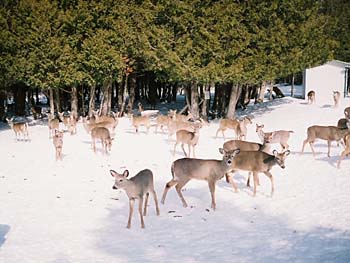
The Colorado Division of Wildlife is planning to start emergency feeding operations for big game animals in the Gunnison Basin as soon as possible. Mule deer will be targeted because they are most impacted by adverse weather conditions. However,feed and hay will also be provided to bighorn sheep, pronghorn and elk.
Providing feed to wildlife requires a major undertaking and many personnel hours, and the DOW is seeking volunteers to help with the emergency feeding effort. DOW wildlife managers are now working on the logistics of the operation. While some feeding will start as soon as material is available, the effort will increase as feed, specially formulated for deer,becomes available from a mill next week.
Wildlife officials are concerned that deep snow and extremely cold temperatures in the Gunnison basin are causing deer to deplete their energy reserves too early this winter. Without supplemental food, mortality could reach unacceptable levels. The snowpack in the Gunnison Basin is now at 143 percent of average. It is difficult for deer to push through deep, crusted snow to get to natural food sources. Big game animals lose 30 percent of their body weight during a normal winter. When they lose more than that their survival can be severely compromised.
In the Gunnison area, there are about 260 bighorn sheep in several herds where feed could effectively be delivered. Bighorn sheep winter in steep terrain that doesn’t usually hold snow, so they are not as affected by the snow depth.
About 600 pronghorn also live in the area and efforts will be made to feed them. Unfortunately, the DOW has had limited success in getting pronghorn to take supplemental feed. The DOW will attempt to feed them with smaller wafers that have worked previously.&
“So far, deer appear to be in pretty good condition for this time of year given the current weather and snow depth,” explained J Wenum, area wildlife manager in Gunnison.